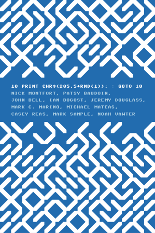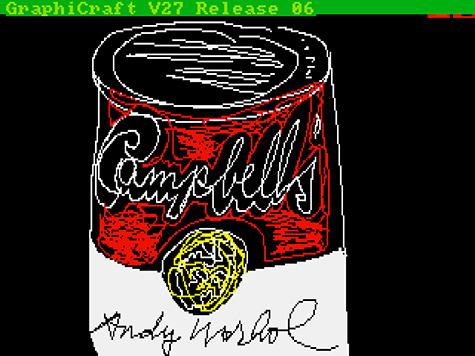Dartmouth is celebrating the 50th anniversary of BASIC tomorrow with several events, including the premiere of a documentary on BASIC that I hope to see soon. I teach two classes tomorrow; those and my other meetings will make it impossible for me to stop by, even though Dartmouth is not very far away.
There’s also a celebratory Time article about BASIC, one that is packed with nice photos, scans, and GIFs showing how programs were listed and how they ran. The GIFs include a sped-up one of 10 PRINT running in an emulator, and there’s a link to 10 PRINT CHR$ (205.5 + RND (1)); : GOTO 10, our book (by Nick Montfort, Patsy Baudoin, John Bell, Ian Bogost, Jeremy Douglass, Mark C. Marino, Michael Mateas, Casey Reas, Mark Sample, and Noah Vawter).
I do genuinely appreciate the link and the article overall – there’s excellent discussion of popular programming, recollections of personally writing BASIC, BASIC in books and magazines, and even David Brin’s 2006 Salon article – but it’s too bad our book is (twice) referred to as “a book of essays” when it is actually a single book-length academic study of the title program; quite in distinction to a book of essays, it was written by the ten of us in a single voice. The book, which among other things provides the major academic study of BASIC this century, is also available for free online and anyone can download/open it in seconds to check it out. And if such a glance entices a reader, he or she may, like the popular BASIC programmer of the late 1970s and 1980s, dive further in and learn about formal, material, cultural, historical, and other aspects of the title program, the Commodore 64, BASIC, and more.




 This Monday (2014-04-28) Purple Blurb is proud to host a screening and discussion of narrative video art work done in collaboration with Roderick Coover, including _The Last Volcano, Cats and Rats, Three Rails Live,_ and _Toxicity._ (The last two are combinatory pieces; _Three Rails Live_ is a collaboration between Coover, Rettberg, and Nick Montfort.) These pieces deal with personal and global catastrophes and are written across languages, with one of the voices in _Cats and Rats_ in (subtitled) Norwegian. They continue Rettberg’s work on novel-length electronic literature projects and his frequent collaboration with others.
This Monday (2014-04-28) Purple Blurb is proud to host a screening and discussion of narrative video art work done in collaboration with Roderick Coover, including _The Last Volcano, Cats and Rats, Three Rails Live,_ and _Toxicity._ (The last two are combinatory pieces; _Three Rails Live_ is a collaboration between Coover, Rettberg, and Nick Montfort.) These pieces deal with personal and global catastrophes and are written across languages, with one of the voices in _Cats and Rats_ in (subtitled) Norwegian. They continue Rettberg’s work on novel-length electronic literature projects and his frequent collaboration with others.


